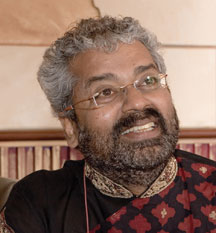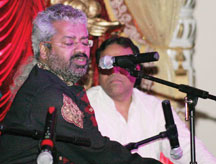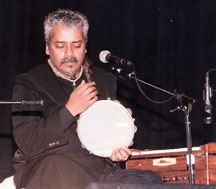Arts
Halka Nasha

Music changes with the times, says Hariharan, and we have to accept change.
|
Trained both in Hindustani and Carnatic classical music, Hariharan is one of the best singers to emerge from India in the last three decades. A singer who spans various genres and languages with equal facility, Hariharan’s journey was long and arduous. The music maestro, also known as the creator of Urdu Blues, talks about his music and life. What are your earliest memories of music?
I was fortunate enough to be surrounded by high quality music, because I come from a family of musicians. My grandfather, a multi-dimensional man, came to Bombay from Kerala, with a drama troupe and never went back. He became famous by the name of Harmonium Vardhan and performed with Marathi Opera singers. All the South Indian musicians who came to Bombay always stopped by at our house and there was music and recording going on all the time. He would listen to both North Indian and South Indian music and so I also got to hear them all. Bombay in those times was not such a crazy place. People didn’t run so much after fame and money. I guess in those days they had time to be human and everyone helped each other out. Unfortunately my father died very young. I was only 8 or 9 then and I’m an only child. How did your mother manage? Amma was always very passionate about music. She sang on stage and also taught. We lived frugally and of course my grandfather was there to help us. My mom has had a career throughout. Even today she has between 1000-1500 students scattered all over the world. Wherever I go I always get some phone calls asking me, “How is teacher?” How easy is it to learn from your own mother?
Well, I’m an only child and we are very close, but while she has a terrible soft corner for me, the teacher in her was always there to guide me. She is also my sounding board. She would attend my concerts and tell me what worked and what didn’t. She always said that no matter what you sing, it must be at the highest level throughout. You can’t come up with four top notch phrases and then slip in the 5th one. The consistency of perfection must be maintained till it becomes second nature and emerges effortlessly. Do not create waste either in the words or the music you sing. She told me to get my basic education out of the way. The day I got my law degree, I gave it to her, did pranam and said Amma this is for you. Now let me go and concentrate on my music. Amma is the one who supported me through those years with whatever she earned. I got my first serious break between the ages of 33-35. There are so many people the world over who remember me from the Aarohi and Shyam-e-Ghazal days. I still remember this old couple who came to meet me and the wife said to her husband, Maine kaha tha na aapko, ki yeh bahut bada admi banega? (I told you he will be a big man). I looked at the husband and he explained that his wife used to watch me sing on these television programs as a struggling young artist and would tell her husband that she saw something in me that made her believe I would make it big someday. I was deeply moved. I’d like you to talk about some of the amazing musicians you have worked with. I have been one of Ghulam Mustafa Khan’s oldest students and I’m still his student. He is a fakir – an ascetic in his soul. A true guru is someone just like him, one who teaches you the moral values of life along with the music. When you think with purity and goodness, it is naturally hreflected in your music. I was very close to Jaidevji. He was truly my friend, philosopher and guide. He said I know you want to become a playback singer but remember you have all that it takes to become a performing artist. Salil Chaudhry was the master of the complex. He took so many aspects of Western music and beautifully blended them with Indian music. Today we talk so much about fusion music but you realize after listening to someone like him that fusion music in India has been around for so many years. Naushad sahib was an amazing man. I sang for him in his last film Taj Mahal. He was in his late eighties and even then razor sharp. If I deviated a little from the tune he had set he would catch that instantly. He was so dedicated he would be there from beginning to the ending of the recordings.
I remember this very melodic song I recorded with R.D. Burman. I was always a bit tense because he was such a genius, so afterwards I asked him hesitatingly, “How was it Pancham da?” He said “Achcha gaya tuney” (You sang well). I said hesitatingly, “Will we do only one take?” He turned and said, “Kaha na maine achcha gaya!” (Didn’t I say you sang well). I realized that he was a man of few words, but very sincere in his appreciation. Asha ji and he were very kind to me. Annu Malik is one of the most underrated musicians in the film industry. He gets lambasted all the time for something or the other, but he has come up with some great music. The song I sang for him in Border won me the national award. A.R. Rahman has changed the face of music. He told me he bought several copies of my album Reflections and already knew of me as an artist and as a singer. He always gives me a free hand to improvise and selects some wonderful songs for me to sing. He is a great human being, very easy to work with, without any heavy baggage. You have sung across the nation both in the North and South Indian music industries. What is the difference between the two? There has always been a lot of talk about the face of Ghazal changing. Some artists feel the soul of ghazal is lost and that what Begum Akhtar sang was the true quintessential style. I think if an artist has a rich classical background, it will show in any genre of music that he/she sings in. There are two kinds of ghazal singing, one in the true classical style of Begum Akhtar sung the traditional way and the other which is geetnuma Ghazal, which I think is the one getting the bad rap. Every great ghazal singer has added their own enrichment and style to the genre of ghazal singing. I listened to so many different singers and then created my own unique style. Music changes with time and you just cannot recreate music that is passé, because no one will listen to it. These days we hear so much criticism of fusion. It is a very legitimate genre of music today. Of course quality matters. My take on it is if you can take element A, B, and C from different music styles and fuse it together to create element D seamlessly without making A, B, and C visible in the final fusion, it can be great music in the right hands. Vocalization, our society, and life itself is nothing but a fusion of different things. While I have great respect for the past, its unfair to glorify it to such an extreme extent that you stop appreciating some of the outstanding musicians you see before you. What becomes popular is the need of the day. We have had many Pakistani musicians cross over to the Indian music industry. You did the opposite and worked in Lahore to create your amazing album Lahore ke Rang Hari ke sang. Lets talk about your album Kaash. It created what you call Urdu Blues with its jazzy sound. I see the title song requested in every concert. Kaash remains a major milestone in my life. When ghazal gayaki was at its peak in the 70s, I was struggling and didn’t have the powerful style I finally achieved 10 years later. Kaash was the result of that maturation. I played it for Javed Akhtar and when it ended he said, “Oh is it over? So soon?” Then he gave a sigh and said, “Hari, it would be most unfair of me to say this is a good album.” My heart was in my mouth by then. He looked at me and with a twinkle said, “This is a path breaking album.” Your fusion band Colonial Cousins was a block buster success. Anything new on that horizon? |



